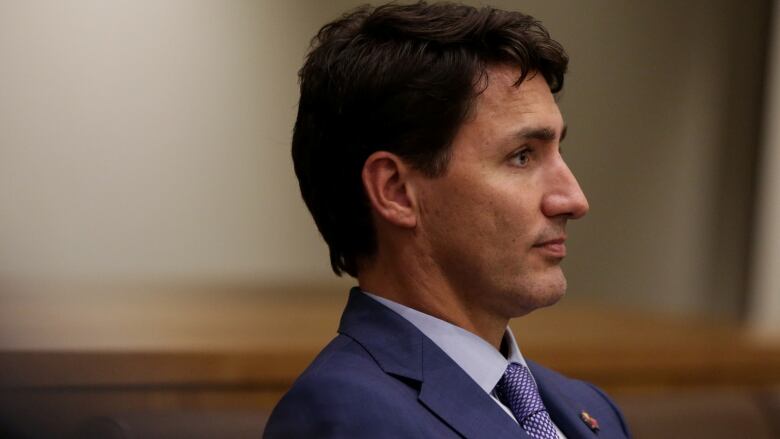Canada joins multilateral move to take Venezuelan government to International Criminal Court
Referring another country to court in The Hague is a 1st for Canada

Canada will join five South American nations in signing a formal request for the International Criminal Courtto investigate the Venezuelan government of Nicolas Maduro.
It marks the first timeCanada has tried to take another country before the ICC in its 20 years as a member. Based in the Netherlands, the courtprosecutes war crimes, crimes against humanity and genocide.
Canada joins Argentina, Chile, Colombia, Paraguay and Peru in signing the referral. Each of those countrieshas received migrants fleeing the humanitarian crisis in Venezuela, with Colombia and Peru receiving the lion's share.
There will be a signing ceremony for the referral on Wednesday morning at United Nations headquarters in New York.
Government sources toldCBCthat Canada's decision to refer Venezuela is also meant as a show of support for the ICC, an institutionthis country believes inthat isunder attack.
The U.S. joined the courtin 2000 under the Clinton administration, but two years later, President George W. Bush "unsigned" the treatyand informed the UN that the U.S. would neither recognize nor co-operate with the ICC.
Bush's UN ambassador, John Bolton, was well known for his hostility to the institution, and now that he has returned to government as President Donald Trump's national security adviser, the U.S. administration has become openly hostile to the court.
Watch: U.S. national security adviser John Bolton says U.S. won't co-operate with the ICC
On Sept. 10, Bolton threatened U.S. sanctions against the court and its judges and prosecutors shouldthey ever pursuea case against Israel or the U.S.
Calling the ICC an "illegitimate court,"Bolton told Washington's Federalist Club:
"We will let the ICC die on its own. After all, to all intents and purposes, the ICC is already dead to us."
The threat came as ICC judges mulled whether to investigate the U.S. for alleged war crimes in Afghanistan.
Some African governments have also recently threatened to withdraw from the ICC, accusing it of taking up a disproportionate number of cases from that continent.
Sending a message
Trudeau was asked in New York on Wednesday what kind of message he was sending to the U.S. by validating the court's role with his signature on the letter.
"The message is that the situation in Venezuela is catastrophic. There is a humanitarian crisis going on in a country that used to be one of the most successful and prosperous countries in south America," Trudeau said.
Trudeau said the humanitarian crisis in Venezuela is of concern not only to that country's neighbours, and to Canada, but to the world as a whole.
"And might I say that in my conversations with American officials and leaders the concern that we share, both of us, as countries, on Venezuela is real and we are always looking for ways to help the Venezuelan people," he added.
Trudeau also said that he had no plans to meet withMaduroat the UN this week in New York.
Two strikes for Venezuela
In the Americas, the only countries that have declined to join the court are the U.S., Cuba and Nicaragua.
Venezuela is a signatory, and that makes it subject to the court's jurisdiction.

This past summer, the Organization of American States brought forward a complaint against the Maduro governmentbased on a report prepared by three respected international jurists, including Canada's former justice minister,Irwin Cotler.
The complaint details cases of alleged torture as well as politically motivated killings and disappearances for which it blames Venezuela's socialist government. It documents 8,292 extrajudicial executions, mostly of poor Venezuelans caught in police sweeps, as well as 131 killings of regime opponents and critics. It also accuses Venezuela of holding 1,300 political prisoners,and of having arbitrarily detained 12,000 citizens since 2013.
The ICC referralfrom the six American nations, including Canada, is expected to focus on the same allegations.
U.S. unlikely to object
Although the Trump administration is hostile to the ICC, it has said it will only impose sanctions if the court pursues cases against the U.S. or itsallies. That clearly does not include Venezuela.
On Tuesday, Trump used his speech to the UN General Assembly to excoriate the Maduro regimeand announce new sanctions against its leaders.
"More than twomillion people have fled the anguish inflicted by the socialist Maduro regime and its Cuban sponsors," he said.
"Not long ago, Venezuela was one of the richest countries on Earth. Today, socialism has bankrupted the oil-rich nation and driven its people into abject poverty."
Venezuelan Foreign Minister Jorge Arreaza, also in New York for the General Assembly, hit back at Trump, accusing him of presiding over "a dictatorship."
"They are withdrawing from international organizations," he said."They are withdrawing from multilateral agreements, climate change, Human Rights Council, migration compact, and many others. Because they don't believe in the multilateral system. They believe in unilateralism. They believe in domination, as if they owned the world."
Venezuela has yet to react officially to Canada's decision to refer it to the ICC.
With files from Reuters












_(720p).jpg)


 OFFICIAL HD MUSIC VIDEO.jpg)
.jpg)



























































































